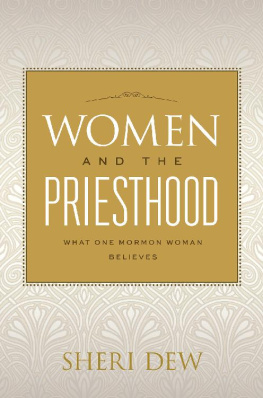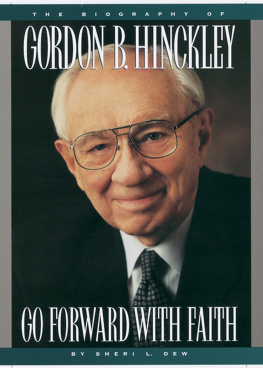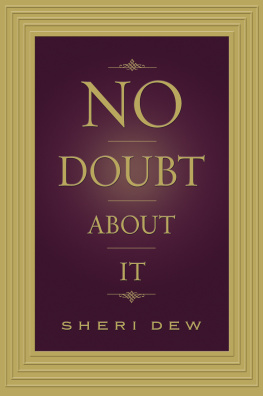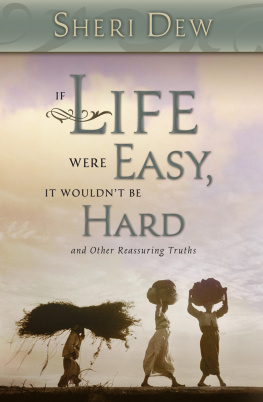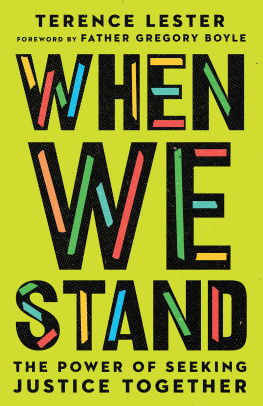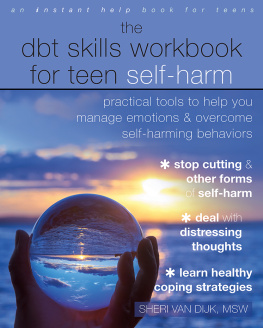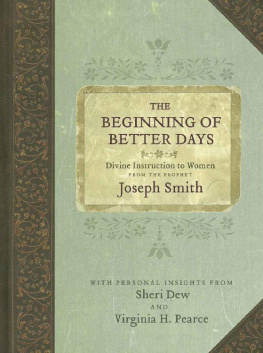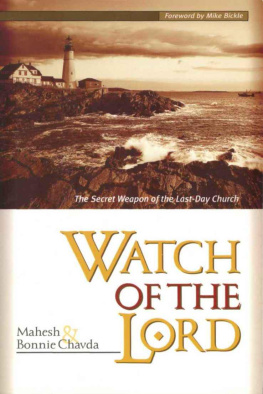No One Can Take Your Place
Sheri Dew
2004 Sheri L. Dew.
All rights reserved. No part of this book may be reproduced in any form or by any means without permission in writing from the publisher, Deseret Book Company, P.O. Box 30178, Salt Lake City Utah 30178. This work is not an official publication of The Church of Jesus Christ of Latter-day Saints. The views expressed herein are the responsibility of the author and do not necessarily represent the position of the Church or of Deseret Book. Deseret Book is a registered trademark of Deseret Book Company.
We Are Men and Women of God
We Are Men and Women of God
One
We Will Not Flinch
Premortally, in the most difficult of circumstances, we stood loyally by our Father and His Son, and we did not flinch. The question for us today is: How will we do it again?
In hate snakes.No, let me restate that: I am terrified of snakes. Traumatized by snakes. Completely undone by snakes. My fear got so bad when I was growing up that whenever there was a snake-sighting on our Kansas farm, Mother would instruct my siblings not to tell mebecause even the knowledge that the slimy critters had been spotted in the vicinity was enough to keep me indoors. Embarrassing as it is to admit it, this phobia is so extreme that it is one of the few things that limits where I'm willing to go or walk or hike. There just isn't much that's worth risking the possibility of running into a snake.
Just recently I had knee surgery, and as soon as my knee would allow I began taking long walks, cane in hand, to try to regain the strength and flexibility in my knee. One day a friend and I set off on an early-morning walk, and at one point I suggested we follow a trail that went into the foothills near my home. We were chatting about this and that, enjoying a beautiful, clear summer morning. I was just ready to tell my friend I thought my knee had gone about as far as it was going to make it, when suddenly, dead ahead in the trail, I saw something sinister begin to coil. I instantly screamed, "Rattlesnake!" and then began the fastest exit you've ever seen by a middle-aged woman recovering from knee surgery. As I hopped and half-ran back down the path, I was trembling. And for days, each time that disgusting image came to mind, it made me shiver and react all over again.
I couldn't help but think about that experience when I recently came across a statement by President George Q. Cannon. He said that when Satan unleashed his fury against the Father and the Son in the premortal world and was cast out of heaven, we who are here today "stood loyally by God and by Jesus, and... did not flinch" (Gospel Truth,7).
Webster defines flinch as "to shrink from" or "to tense involuntarily in fear." I guarantee that I did more than tense involuntarily in fear when I saw that snake, which is not only a creepy creature but to me symbolizes all that is evil.
There are a lot of things in the world today that ought to make us flinch, things from which we ought to shrinkdistractions, deceptions, and snares inspired by Satan for the express purpose of trapping and derailing us. But on the other hand, once again, as Satan increasingly unleashes his fury against the Father and the Son, by unleashing his fury against all who are determined to "stand as witnesses of God at all times and in all things, and in all places" (Mosiah 18:9), we have the challenge of doing again what we have done beforeof standing loyally by God and by Jesus and not flinching even in the face of the onslaught.
Bottom line: Premortally, in the most difficult of circumstances, we stood loyally by our Father and His Son, and we did not flinch. The question for us today is: How will we do it again?
For starters, we would be wise to see how those who've gone before us managed the same challenge. The scriptures are replete with examples of faithful, determined, committed men and women who did not flinch. Moses' encounter with Lucifer is a perfect example. Four times the adversary tried to tempt and deceive Moses: "Satan came tempting him, saying: Moses, son of man, worship me" (Moses 1:12). But because Moses had earlier had a spectacular experience with God, he could easily distinguish between God and Satan, so he wasn't fooled. "Get thee hence, Satan; deceive me not," he responded. "I will not cease to call upon God, I have other things to inquire of him: for his glory has been upon me, wherefore I can judge between him and thee. Depart hence, Satan" (Moses 1:16, 18).
But Satan didn't stop there. He ranted and railed, enough that Moses feared exceedingly. "Nevertheless, calling upon God, [Moses] received strength, and he commanded, saying: Depart from me, Satan, for this one God only will I worship, which is the God of glory" (Moses 1:20).
Yet a third and a fourth time Moses had to command Lucifer to leave, but because Moses stood firm and did not flinch in the face of terrifying evil, commanding him in the name of the Only Begotten to depart, Satan had no option but to leave.
Moses did not flinch. He didn't flinch because he could distinguish between good and evil. He detected Satan right off the bat and stood firm against him. He was strong because he knew what power to call upon to deliver him from evil.
Abinadi didn't flinch either, when he was taken before King Noah. Pressed to deny that Christ would come, he responded: "I will not recall the words which I have spoken concerning this people, for they are true; and that ye may know of their surety I have suffered myself that I have fallen into your hands. Yea, and I will suffer even until death, and I will not recall my words, and they shall stand as a testimony against you" (Mosiah 17:9-10).
Abinadi did not recall his words. He died a martyr's death. Because he had an impenetrable witness of the coming of Jesus Christ, he stood firm.
Jacob didn't flinch when confronted by the articulate, intelligent Sherem, the anti-Christ, who knew how to draw upon the power of the devil (see Jacob 7:4). Jacob wasn't confused, distracted, or deceived. By his own account he explained why: "And [Sherem] had hope to shake me from the faith, notwithstanding the many revelations and the many things which I had seen... for I truly had seen angels, and they had ministered unto me. And also, I had heard the voice of the Lord speaking unto me in very word, from time to time; wherefore, I could not be shaken" (Jacob 7:5).
The list of noble men and women who have stood firm in the face of frightening evils, temptations, or mortal obstacles goes on and on. Many more will be identified throughout the pages of this bookmany who "with unwearyingness declared the word" (Helaman 10:4) and who were "no less serviceable" (Alma 48:19), who stood loyally by God and by Jesus and did not flinch. They all had something in common: They believed in Jesus Christ. They understood the fundamental doctrines of the gospel, including where and how to turn for help. And they knew how to draw upon the power of God.
The questions for us are fairly simple: Do we have an impenetrable testimony of Jesus Christ? Do we know where and how to turn for help? Do we know how to draw upon the power of God? Do we understand how magnificent and how encompassing the doctrines of the gospel really are?
Not long ago I heard President Gordon B. Hinckley declare, simply, "I just wish I could tell the whole world what we believe. Because the gospel makes so much sense!"
I thought about this recently during a trip to New York City. My work has taken me to that city dozens of times, and as a result I've been to Central Park many times. I've taken walks there, introduced family and friends to favorite spots, and basically just enjoyed this rather remarkable stretch of green in the middle of a concrete jungle. And frankly, as lovely as the park was, I always felt New Yorkers made a little too much of it. I'd reached the conclusion that they prized it so much because it was the only grass in Manhattan.


